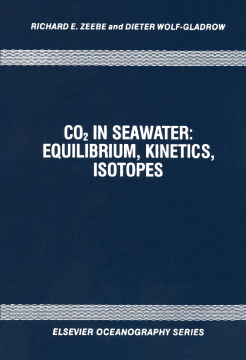
Additional Information
Book Details
Abstract
Carbon dioxide is the most important greenhouse gas after water vapor in the atmosphere of the earth. More than 98% of the carbon of the atmosphere-ocean system is stored in the oceans as dissolved inorganic carbon. The key for understanding critical processes of the marine carbon cycle is a sound knowledge of the seawater carbonate chemistry, including equilibrium and nonequilibrium properties as well as stable isotope fractionation.
Presenting the first coherent text describing equilibrium and nonequilibrium properties and stable isotope fractionation among the elements of the carbonate system. This volume presents an overview and a synthesis of these subjects which should be useful for graduate students and researchers in various fields such as biogeochemistry, chemical oceanography, paleoceanography, marine biology, marine chemistry, marine geology, and others.
The volume includes an introduction to the equilibrium properties of the carbonate system in which basic concepts such as equilibrium constants, alkalinity, pH scales, and buffering are discussed. It also deals with the nonequilibrium properties of the seawater carbonate chemistry. Whereas principle of chemical kinetics are recapitulated, reaction rates and relaxation times of the carbonate system are considered in details. The book also provides a general introduction to stable isotope fractionation and describes the partitioning of carbon, oxygen, and boron isotopes between the species of the carbonate system. The appendix contains formulas for the equilibrium constants of the carbonate system, mathematical expressions to calculate carbonate system parameters, answers to exercises and more.
C. Goyet
...What makes this book unique is that, to my knowledge, there are no other books or articles accessible to the scientific public that cover all these aspects of the CO2 properties in seawater. ...a good achievement, drawing together both traditional and recent knowledge on the complexity of carbon chemistry in the ocean. However people approach this book, either reading it through or picking out specific information, they will be rewarded. One way or another, students and scientists concerned with the oceanic carbon cycle (except for the anthropogenic part) should be users of this book.
Limnolgy & Oceanography Bulletin
